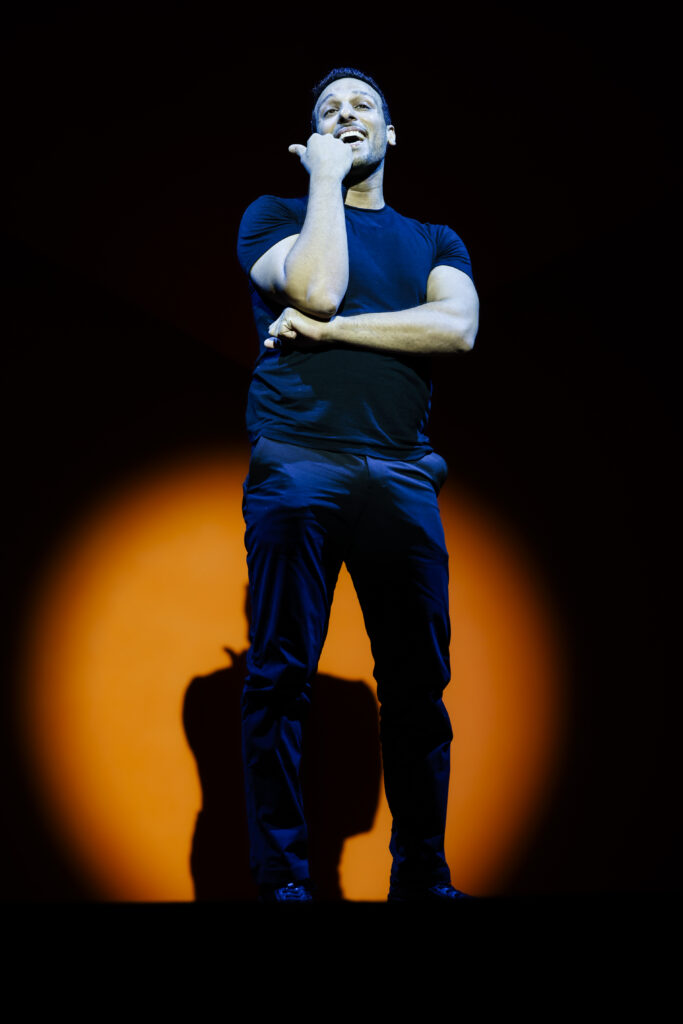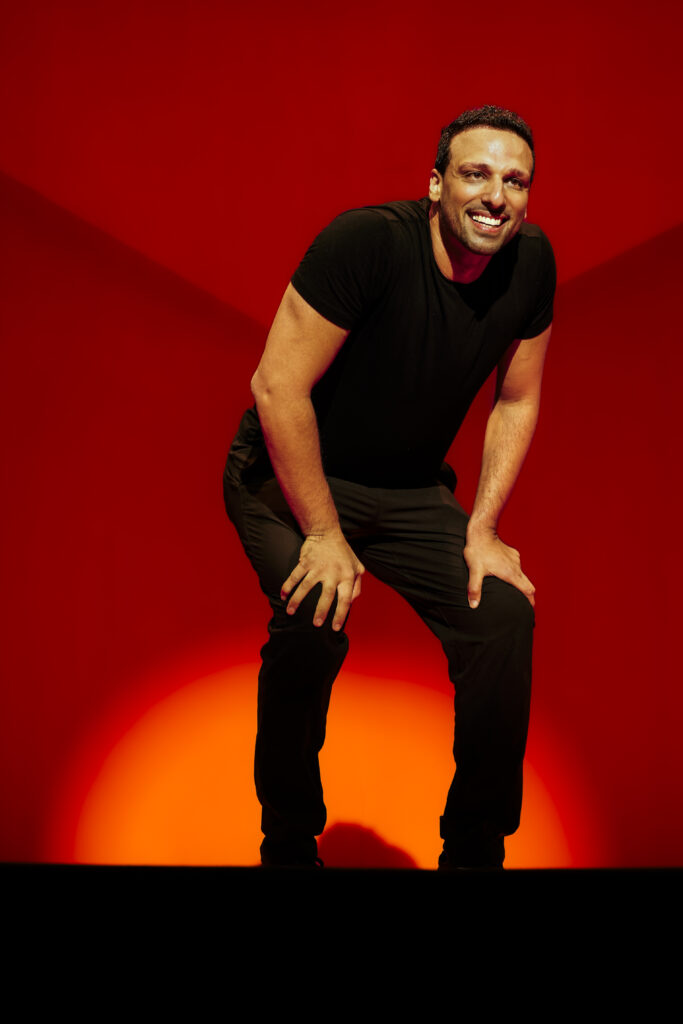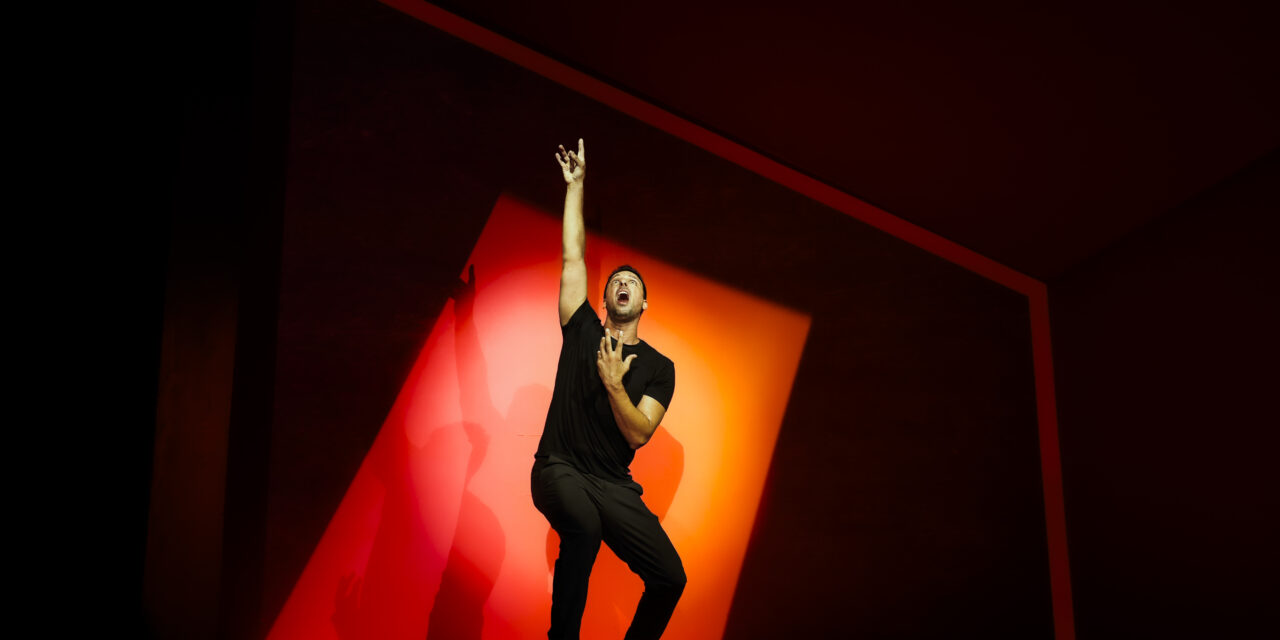Review by Ron Fassler . . .
The 34-year-old Ari’el Stachel is blessed with charm for days. Anyone who saw his Tony Award-winning performance in The Band’s Visit were enchanted by his intelligence, good looks, and physically fit stage presence in addition to a beautiful singing voice. Now back onstage at the Greenwich House Theatre, he is offering his life story in Other, a play he has written revealing his deepest anxieties and fears that began as early as age five with a diagnosis of obsessive-compulsive disorder (OCD). As far as self-confessional, one-person theatrical experiences go, I’m of the mind that many well-intentioned performers would be better off confining their thoughts and feelings to clergy or therapists. It’s often difficult to feel comfortable while simultaneously being entertained at the sight of someone sharing deep, often dark secrets with a roomful of strangers. But that assessment is reserved for lesser actors and writers than Stachel. Performing with lightning speed as many as 40 characters over the course of 80 minutes—men, women, and children of all races and ethnicities drawn with heroic strength and precision—completely draws you in by his superior talents as an actor and writer.
Opening the show with audio of the envelope being opened announcing his Tony win, Stachel launches into the invasion of well-wishers at the Tonys ball, forcing him to take continual refuge in the bathroom to pat down his excessive sweating and to speak bromides into the mirror that everything is okay. As he tells us, “I always fantasized about winning a Tony but hiding in the bathroom was not part of that fantasy.” In fact, his excessive sweating is such a burden that he dreams of being Shaquille O’Neal and “to have a job where sweating is celebrated.” As Charlie Brown once said, “Even my anxieties have anxieties,” and Stachel’s life has been filled with fighting demons. Well, one demon in particular: a voice in his head that makes him unable to accomplish even mundane, daily activities without being constantly second-guessed or misguided by intrusive thoughts. At six, he named the voice Meredith after the evil stepmother-to-be in the 1998 remake of The Parent Trap, a favorite film of his at the time.

There’s also great sadness in how Stachel felt forced, even from a young age, to twist himself into knots in order to deal with his ethnicity. Born and raised in Berkeley, California, his brown skin makes him look decidedly Middle Eastern. But his father is a Yemenite Jew born and raised in Israel and his mother is an Ashkenazi Jew from New York. It was the angst caused by 9-11, which happened when he was ten years old, that made him switch schools, a constant in his life to deal with his anxieties. He also began using his mother’s last name to avoid being bullied and, due to his father’s beard and dark skin, he began telling kids at his new school that the man he lived with was his uncle and not his father (his parents were divorced). The shame he carried bled into every aspect of his being and, for a time to try and fit in, he convinced his friends in Oakland that he was half-Black. The double meaning of the title is significant: he is both an “other,” the box he checks off on forms when asked his racial identity, as well as his “other”—whom he identifies as Meredith, the constant voice in his ear. As he told the New York Times in a recent interview: “Part of why I wrote this play is that I have never seen my culture reflected, ever: a Jewish person with roots in the Arab world.”
Often told with great humor, his finally “coming out” as Middle Eastern invokes such laugh lines as “I ate shawarma like it was my job!” His characterization of Sheila, a woman he meets in Uganda and who tells him that he is crazy—“You’re white!”—is only one of the more remarkable people he essays over the course of the evening.
Directed with a firm but gentle hand by Tony Taccone, there is barely a set (credited to Afsoon Pajourfar) and few props, which add to all that Stachel conveys so adeptly. The Lighting + Projection Design by Alexander V. Nicols are well done and Madeleine Oldham, with the rare credit of Dramaturg and Sound Design, provides some wonderful effects. For the record, Stachel is unmiked in the modest-sized house—a small thing that in today’s theatre stands as a major accomplishment—bravo!.

Mention must be made that Stachel is a sweater—something he discusses at length, often hilariously so. It’s a manifestation of how his anxiety releases itself, a condition that has caused him no end of embarrassment and trouble over the years. Once, it led to shutting down an episode of Law & Order he was shooting; a show in which he had a recurring role. Sweating profusely throughout the play, his dressing in black from head to toe is a wise choice.
As exhausting as being Ari’el Stachel may be, it’s not at all so accompanying him as he shares his personal journey. It’s well worth a visit (band not included).
Other is now playing at the Greenwich House Theatre, 27 Barrow Street, NYC, in a limited engagement through December 6th. For further information, please visit: https://www.othertheplay.com
Photos by Ogata.


